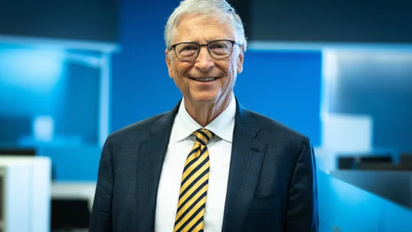'AI may replace humans': Microsoft founder Bill Gates predicts 2-day work week in next 10 years (WATCH)

Synopsis
Bill Gates predicts AI advancements could lead to a two-day workweek within a decade due to automation. He highlights potential impacts on medicine and education, envisioning widespread access to AI-powered services.
Bill Gates predicts AI could lead to a two-day workweek within a decade, citing rapid automation. The co-founder of Microsoft predicted that the development of AI will drastically cut down on the demand for human labour, pointing out possible effects on fields like education and medical and imagining broad access to AI-powered services.
On "The Tonight Show," which aired in February but has since gone viral, Gates stated, "And it's [AI technology] kind of profound because it solves all these specific problems, like we don't have enough doctors or mental-health professionals but it brings with it kind of so much change."
“You know, what will jobs be like? Should we, you know, just work like 2 or 3 days a week? So I love the way it'll drive innovation forward, but I think it's a little bit unknown,” he added. “At the current pace of innovation in AI,” he said, humans may no longer be needed “for most things.”
Gates had already alluded to a substantial cutback in working hours. He predicted that society may "eventually" move towards a situation where a three-day workweek becomes the standard in 2023, when ChatGPT was only getting started.
Two professions to be impacted the most by AI as per Bill Gates
Gates admitted that certain industries would see more significant changes than others in terms of the particular professions that are most likely to be affected by AI's intrusion into the workplace. He notably mentioned in his talk that two fields that are ready for major change—albeit with the potential for tremendous social benefits—are medicine and education.
"As AI continues to advance over the next ten years, intelligence will become widely accessible and ubiquitous, enabling access to first-rate medical advice and outstanding tutoring," Gates said. He sees a future in which artificial intelligence (AI) manages almost all other duties, even if he noted that some human-centric activities, like professional baseball, would probably continue to be done by humans. In terms of manufacturing, shipping, and food production, "there will be certain activities that we reserve for ourselves, but those will basically become solved problems over time," Gates said.
Find the latest Technology News covering Smartphone Updates, AI (Artificial Intelligence) breakthroughs, and innovations in space exploration. Stay updated on gadgets, apps, and digital trends with expert reviews, product comparisons, and tech insights. Download the Asianet News Official App from the Android Play Store and iPhone App Store for everything shaping the future of technology.